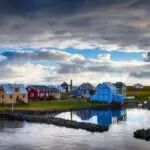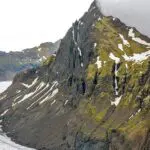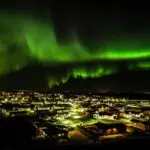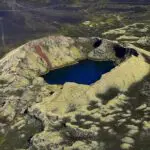Outlaws in Iceland were feared. The average Icelander feared them even more than ghosts. It is understandable to fear them, as they were real but probably not as common as people believed.
Being outlawed or exiled was one of the punishments in Iceland during the Icelandic commonwealth. It was the most severe type of punishment available. They had no legal protection, were outlawed from society, and could be killed with impunity if someone came upon them.
Two of the most famous men exiled during the Icelandic commonwealth were Gísli Súrsson and Grettir Ásmundarson. Gísla saga Súrssonar and Grettis saga tell their tales.
Other famous outlaws in Iceland were Fjalla-Eyvindur and his wife Halla,, who lived in the 18th century. Playwright Jóhann Sigurjónsson wrote a play about them. The haunting and beautiful lullaby Sofðu unga ástin mín is from that play. The two had few children during the 20 years they lived in the Icelandic wilderness, but they all died.
The last known outlaw in Iceland was Jón “Franz” Jónsson, born in 1776. He got a prison sentence for thievery but escaped. He lived in a small cave in Reykjadalur, north of Langjökull glacier. Unlike Fjalla-Eyvindur, he was caught and spent 20 years in Bremerholm prison in Copenhagen. After prison, he lived a few years in Snæfellsnes Peninsula.
Outlaws in Iceland were generally “sheep thieves,” as that was their primary way of getting enough food. Some people also believed there were whole societies of outlaws living in the wilderness without law. This is not true.
Read other fairytales and legends:
- The Shepherd of Silfrúnarstaðir
- The Genesis of the Hidden People
- The Deacon of Myrká
- The Tale of Búkolla – Version 1 and 2
- White Cap
- Dear Mother in the Pen, Pen
- The Story of Mjaðveig Mánadóttir
- The Bishop and The Elves
- Katla’s Dream
- Now I should laugh if I were not dead!
- The Story of Bergþór of Bláfell
- Móhúsa-Skotta
- “The Darkness is Fun”
- The Sorcerers in The Westman Islands
- The Two Sigurds
- The Merman
- The Manservant and the Water-Elves
- Gold Brow
- Sæmundur the Learned and the devil
Úlfsvatn
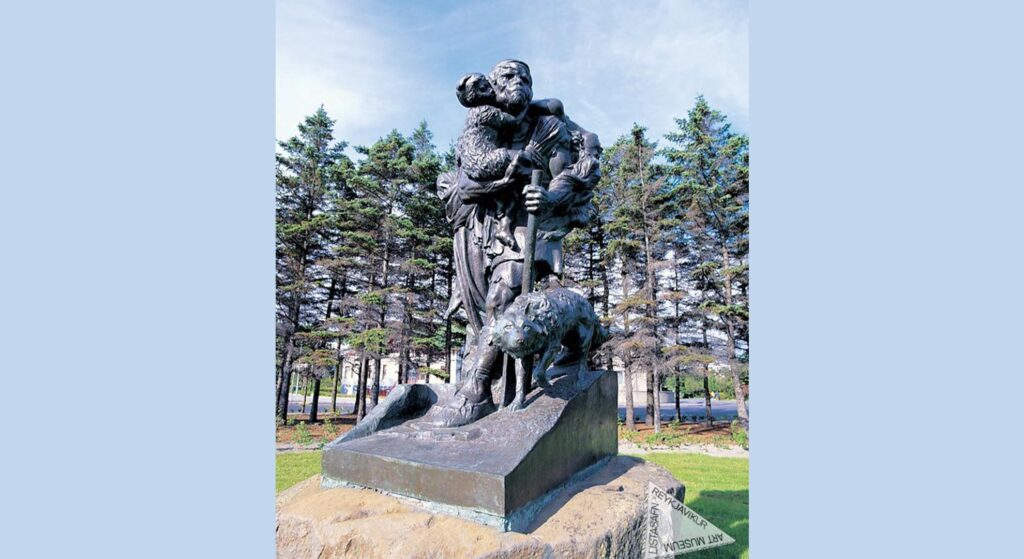
In the upland wilderness, bordering on the valleys of Skagafjörður, there is a fish-lake bight Úlfsvatn, which has got its name in the following way.
At a farm called Mælifellsá, there once lived a wealthy farmer with a son named Guðmundur. He was a hopeful youth withal, strong and well-skilled in wrestling. He often joined people in searching paths and downs and was generally the headman, or mountain-king, as it is called in some parts of Iceland.
Once Guðmundur took part in a search for sheep together with some other people. He had a lad with him. And in their walk, they came to the lake Úlfsvatn, where they saw two lambs and began pursuing them. The lake was covered with ice, and they saw a man lying on it, fishing through a hole in it. As Guðmundur and his lad approached the lake, the fisherman got up and, seizing an axe he had lying at his side, took a swift slide over the ice towards Guðmundur.
When he saw this, the lad took to his heels, but Guðmundur awaited the man’s coming.
When the stranger was near enough, he dealt Guðmundur a blow with his axe. It was in vain, however, as Guðmundur stooped aside, the blow missed him. But at this moment, the axe dropped from the outlaw’s hand. Guðmundur, seizing it, took a slide onto the frozen lake and the outlaw after him. Now they maneuvered thus for a while, pursuing and retreating, till Guðmundur seized the chance and dealt the man a death blow with the axe. As he received the stroke, he called out loud the names: “Brandr, Thorgils, Olafr !”
After this, Guðmundur went to his men, telling them what had happened. They all went to the lake but saw nothing of the fallen man, as he had entirely vanished, but they saw that he had been fetched by some other folk and could follow the blood trail up from the lake.
Guðmundur has to stay home
Hereafter, Guðmundur did not go in search of sheep to these wildernesses but stayed at home, as it was thought that outlaws might be lying in wait for him.
At Mælifellsá, it so happened, once, late in the summer, that the herdsman was ill, and none could watch the sheep but Guðmundur.
But, once, not finding his ewes, he walked over heath and mountain, yet he found no sheep. At this time, he was overtaken by a dense fog and knew nothing of whither he was going, but he went on until he saw a large flock of sheep and a man watching it.
This was an outlaw, and he rushed at once against Guðmundur, and a fierce wrestling ensued, which ended in Guðmundur’s felling his foe. Then the outlaw begged him to spare his life, declaring he would be well rewarded.
Guðmundur asked who he was and where his home was.
The outlaw told him his name was Ólafur, brother to the man he had slain on the lake, whose name had been Úlfur.
“We are,” went he on, “six brothers, and I am the youngest and least of them all. My father lives at a farm not far; hence, he has charmed you hither, for he wants to repay you the slaying of his son and has dug a hole in the path in front of his door, which he is going to make your quarters. We have a sister by the name of Sigríður; she is the most beloved of us all by our father, and she may be of the best help to you if she chooses. My brother Brandur is here, hard by, and if you can fell us both and thus have it in your power to spare both our lives, I doubt not that she will aid you, all she can.”
After this, Guðmundur allowed Ólafur to stand up, and now they went to the place where Brandur was. They took at once to wrestling, and Brandur was, at last, felled by Guðmundur.
Brandur asked him to spare his life, promising him his help and telling him the same as Ólafur had told him. Guðmundur then let him get up and went to the farm, where he found Sigríður outside and brought her her brother’s greeting, saying they prayed to her to aid their life-giver. Sigríður then took him into the upper room of the cowhouse and gave him wine which greatly refreshed him. She told him all about the grave in the path in front of the door and gave him her advice on how to retreat from her father towards the grave.
“But, as you come to the edge of the hole,” she said. “Leap over it, thrusting my father down into it, but scathe of him neither life nor limb. Now, my father is asleep,” she said. “But he will soon awake and know that you are here, and then you shall come up in front of the house and knock at the door.”
This did Guðmundur, and as he knocked at the door, the old man awoke and said: —
“Ah! At last, is Guðmundur here, and he shall surely give me proof of his manliness.”
And he rushed out, and no greetings were exchanged between him and Guðmundur as they flew one against the other and began a desperate strife.
Guðmundur soon found that he had not more than half of the old man’s strength. So, he did nothing but guard himself.
The old man wanted to drive Guðmundur before him towards the hole. Guðmundur availed himself of this, for when he came to the brink, he leaped over the pit and let the old man fall on his head into it.
At this time, Sigríður, and the two brothers with whom Guðmundur had before wrestled, came to the fighters and begged Guðmundur to spare their father’s life, which Guðmundur promised to do if they never would do him any more harm; whereunto the old man pledged his solemn word. After this, the old man was hauled out and thanked Guðmundur for having spared his life and begged him to enter but said that, nevertheless, he knew not how his older sons would put up with this issue of things when they came home.
Then was Guðmundur hospitably treated and, in the evening, locked up in a separate room.
When the older brothers came home at night, they asked if Guðmundur was quietly resting in his hole. But their father told them all as it had passed; after that, they became so enraged that they were going to break the door of Guðmundur’s room.
Their father put himself there, in their way, before the door, and said: —
“First, you must kill me before you become peace-breakers and kill Guðmundur!”
By this, they were calmed down and went to bed. The following day the old man showed Guðmundur to them and forbade them to harm him.
All is well that ends well
Guðmundur dwelt there all the winter. He looked with a loving eye on Sigríður, for she was both fair of face and, in addition to that of so sturdy a growth and so strong, that she could fell all her brothers. Next spring, Guðmundur longed again to return to the peopled lands, and Sigríður would accompany him as she was with child. This her father would not hinder her doing, and forth she went with her lover, who had no rest till he came to Mælifellsá, where all were greatly rejoiced at receiving him, as it were from the land of the dead.
Hereafter Guðmundur married Sigríður, and she was highly thought of as a notable wife and a great shrew. Her brothers found no pleasure in living in the wilderness after her departure, and chiefly so after the death of their father; they moved, therefore, to the peopled districts and became, some of them at least, great farmers in Skagafjörður.
Please signup HERE for our newsletter for more fun facts and information about Iceland!

